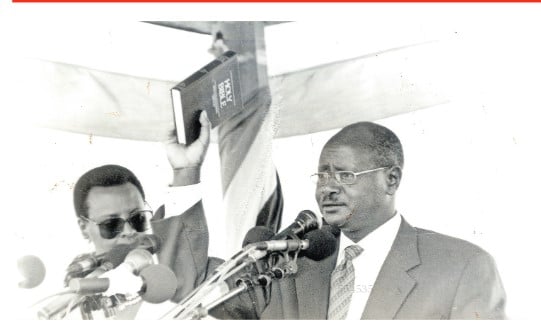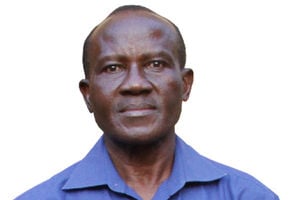
President Museveni (right), accompanied by his wife Janet, swears in for the first time as an elected president in 1996. PHOTO/ FILE
Thirty years ago, the Uganda Law Society (ULS) made public a memorandum that it had sent to the Constituent Assembly (CA) recommending that the President’s powers to make appointments to key positions in government and the Judiciary be trimmed.
The memo demanded that where the President has to appoint any officer, it should be with the “guidance” or “clearance” of a relevant sub-committee of Parliament.
The document was made public at a press conference that then ULS president Solome Bossa addressed on September 16, 1994, in Kampala.
Other members of the ULS leadership who attended the press conference were Mr John Matovu, the treasurer; Mr Wester Byamugisha, the chairman in-charge of general-purpose committee, and Mr Kalule Loyombo, the chairman in-charge of legislative committee.
The memo was partially credited for events that culminated in the inclusion in the Constitution of a requirement that the President appoint Cabinet and State ministers with the approval of Parliament.
The document further showed that ULS had sought to constitutionally bring to an end the practice of appointing MPs to Cabinet positions. ULS recommended that those appointed to take up Cabinet positions vacate their parliamentary seats.
“Members of Parliament should not be ministers. Once appointed minister, a Member of Parliament should resign their seat in Parliament,” the document read in part.
In the same breath, the document sought to bring to an end the practice of appointing MPs to the boards of directors of government parastatals and agencies.
That motion was, however, defeated. The Constitution now provides that MPs can be appointed from among the lawmakers or other persons qualified to be elected MPs.
Scrap ISO
On a rather controversial note, the ULS memo called for the scrapping of the Internal Security Organisation (ISO), saying there was no need to have an organisation whose main role and function was to spy on its citizens, especially members of the political Opposition.
The roles of ISO, they argued, should be carried out by police through the Special Branch and the Criminal Investigations Department (CID) and possibly the Chieftaincy of Military Intelligence (CMI).
The lawyers, however, recommended the retention of the External Security Organisation (ESO) to handle external matters that affect national security.
Against NCS
ULS also recommended the deletion from the draft constitution of a provision that would have led to the creation of a National Council of State (NCS).
According to Kampala lawyer Dan Wandera Ogalo, NCS was meant to serve as a higher House of Parliament to check the powers of the lower House, or Parliament. The body was meant to be constituted of senior citizens who could also advise the President.
At the time ULS sent its recommendations to the House, the draft constitution had suggested that members of the NCS would be appointed by the President, which ULS was opposed to. They were also against the creation of such a body because it would erode most of the powers of both the Judiciary and the Legislature.
“Most of its members are appointed by the President and its composition leaves a lot to be desired because it offends the doctrine of separation of powers,” said the memo.
The lawyers recommended that NCS instead be replaced by parliamentary committees to act as watchdogs of the different organs of government. They also said any conflict between the Legislature and the Executive should be adjudicated upon by the Judiciary.
According to Mr Ogalo, the proposal which had deeply polarised the CA was eventually thrown out after Sam Njuba, then minister for Constitutional Affairs, told the CA that the idea was not originated by the NRM. That led to the conclusion that it had been “smuggled” into the draft constitution.
On army
The lawyers also recommended the recruitment and training of a new army to replace the National Resistance Army (NRA), the armed wing of the ruling NRM.
They argued that it was necessary to put in place a “professional national army representing all people and all shades of opinion that would outlive regimes upon relinquishing power”.
On whether the political system should be detailed in the Constitution, the lawyers argue that it was a contradiction in the first place to state that there should be no derogation of the right to associate and at the same time restrict the right to associate.
“Articles 94-98 which talk of political systems be deleted. On the transitional period, the relevant political parties should agree with the government on the formation of a transitional government and the modus operandi to consolidate the new constitution,” they wrote.
They also recommended the deletion from the draft constitution of the clause on the proposal to use periodic referenda as a means through which political systems could be charged. They described the clause as “superfluous”.
Public interest
The controversial issue of “public interest” which had been the subject of heated debates in the CA also featured prominently in the ULS memo.
The lawyers pointed out that previous governments had been guilty of violating the rights of Ugandans under the guise of protecting “public interest”.
They contested the definition of what amounts to “public interest”, adding that since human rights had been elaborately spelt out in the constitution, it was not in order to provide for instances of derogation as it makes the inviolability of these rights a mockery.
“Provisions on human rights remain as contained in the draft and derogation clauses be deleted. Parliament has the supremacy to make any law under Article 132 for good governance, order and peace in public interest, which it can invoke to derogate clauses on personal liberty,” said the memo.
The memo also poked holes in articles 70-74 of the draft constitution on grounds that they were meant to legalise the infamous Public Order and Security Act of 1967 which had previously been invoked to repress people.
Decentralisation
LS further pointed out that decentralisation under Chapter 13 of the draft constitution was better spelt out than it is under the decentralisation statute. They proposed the amendment of the statute to align with the provisions of the constitution.
Monarchies
The lawyers argued against the inclusion of monarchies in the constitution because enough provisions had already been made under Article 64 of the draft constitution.
“Since Article 64 of the draft constitution clearly entrenches the right to culture, it would be superfluous to specifically provide for monarchies within the constitution”, the memo stated.
No rush
On the possibility of extension of the Movement and the duration of the CA, the lawyers warned against rushing to beat timelines if the country was to end up with a good constitution. At the time, the lifespan of NRM’s interim administration was drawing to a close.
“If the CA cannot finish its work within the prescribed time and it is found necessary to extend its lifespan, the same should be extended even if it means extending the NRM administration,” said the memo.
It should be remembered that the NRM had initially set itself to serve for four years as an interim government, then return power to the people. That period was first extended during an October 11, 1989, vote in the NRC. The justification for the extension was to allow for the completion of the writing of a new constitution.
The lawyer’s memo also recommended that habeas corpus be absolute; that the Constitution recognises the right to bail in light of presumption of innocence; that time limits for holding a person on remand should be set and; that the tenure of office for judges be extended to serve for life save for senility or incapacity to perform.




